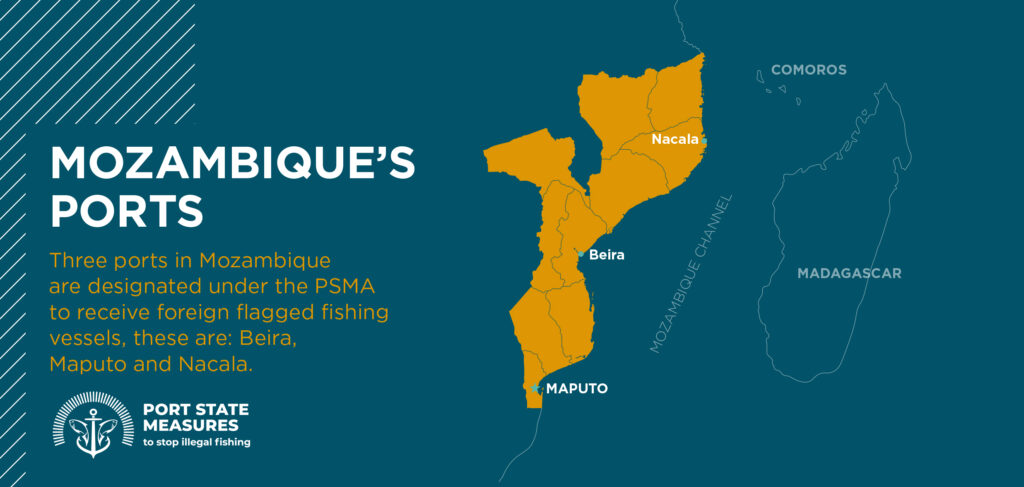By Stop Illegal Fishing:29th Nov, 2021: Port State Measures to Stop Illegal Fishing
New publication: ‘Stopping Illegal Fishing – The Value of Ports for Growing Blue’ in Mozambique
A new publication from Stop Illegal Fishing examines the roles of Mozambique’s ports in stopping illegal fishing and improving vessel safety and working conditions for crew and observers.
Three ports in Mozambique are designated under the PSMA to receive foreign flagged fishing vessels, these are: Beira, Maputo and Nacala. For fishing vessels and reefers Beira and Maputo are of high importance for ensuring the effective implementation of the Food and Agriculture Organization Agreement on Port State Measures (PSMA).
The 2009 PSMA came into force in 2016, and strong uptake of the PSMA demonstrates the recognition that port controls are a low cost, highly effective means of stopping illegal fishing. Mozambique ratified the PSMA in 2014. As a member of the Indian Ocean Tuna Commission (IOTC) Mozambique is also bound to implement Resolution 10/11 on port State measures (PSMs) for tuna and tuna like species.
Mozambique is working to implement port State measures in all three of its ports and they have been designated as PSMA ports.

USING PORTS TO CHECK, INSPECT AND ACT
Illegal operators target ports that they perceive to have weak controls, including where few checks will be made on the vessel’s history, identity, safety, or authorisation to fish. These ports allow catch to be unloaded or transhipped with no checks on whether it has been legally caught, or on the health and wellbeing of crew. These ports contribute to the illegal exploitation of fisheries resources, damage the potential blue economic growth of developing countries and undermine the wellbeing of legitimate fishers.
GROWING INTERAGENCY COOPERATION TO STOP ILLEGAL FISHING
Growing an interagency approach is important because the PSMA while principally a fisheries agreement requires implementation through enhanced liaison with allied authorities. It provides for more stringent and more effective port procedures and increases benefits for legal fisheries operators. By engaging with other agencies improved control of the fisheries sector will send a strong signal rejecting IUU and other illegal activity and promoting sustainable management.
Close cooperation between port authorities and fisheries inspectors is particularly important for exercising control over foreign flagged fishing and support vessels. In addition, cooperation with the marine police, safety, customs, immigration and labour authorities as well as the coastguard or navy are necessary at different stages of the risk assessment, inspection and enforcement process.
Establishing working groups with communication channels for routine sharing of information and an alert system for notification when high-risk or illegal activity is identified are key. This also facilitates crosschecking and verification of information, sharing of resources and cooperation on risk assessment and cases of illegal fishing. Procedures and protocols for the exchange of information and coordination of activities among relevant authorities have proved to be very useful in supporting interagency cooperation.
Implementation of the Agreement on Port State Measures (PSMA) in Mozambique is supported by Stop Illegal Fishing, with funding from the Deutsche Gesellschaft für Internationale Zusammenarbeit (GIZ) and The German Federal Ministry for Economic Cooperation and Development (BMZ). The impact of this work is anticipated to improve opportunities for blue growth and to contribute to the generation of food, nutrition and socio-economic development that will help end poverty and hunger in Mozambique and Africa.
Recent Posts
One year after the first technical training for MCS officers that focussed on...
16th Meeting of the SADC Regional Technical Team for the SADC MCSCC
Mbabane, Kingdom of Eswatini 04-06 March 2024 The 16th meeting of the SADC Regional...
Angolan Minister for Fisheries and Marine Resources committed to end IUU fishing
On 20 February 2024 in Luanda, the Angolan Minister for Fisheries and Marine...